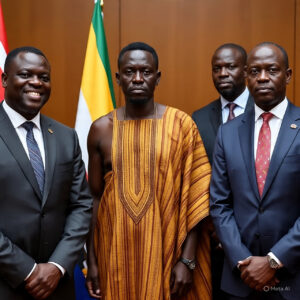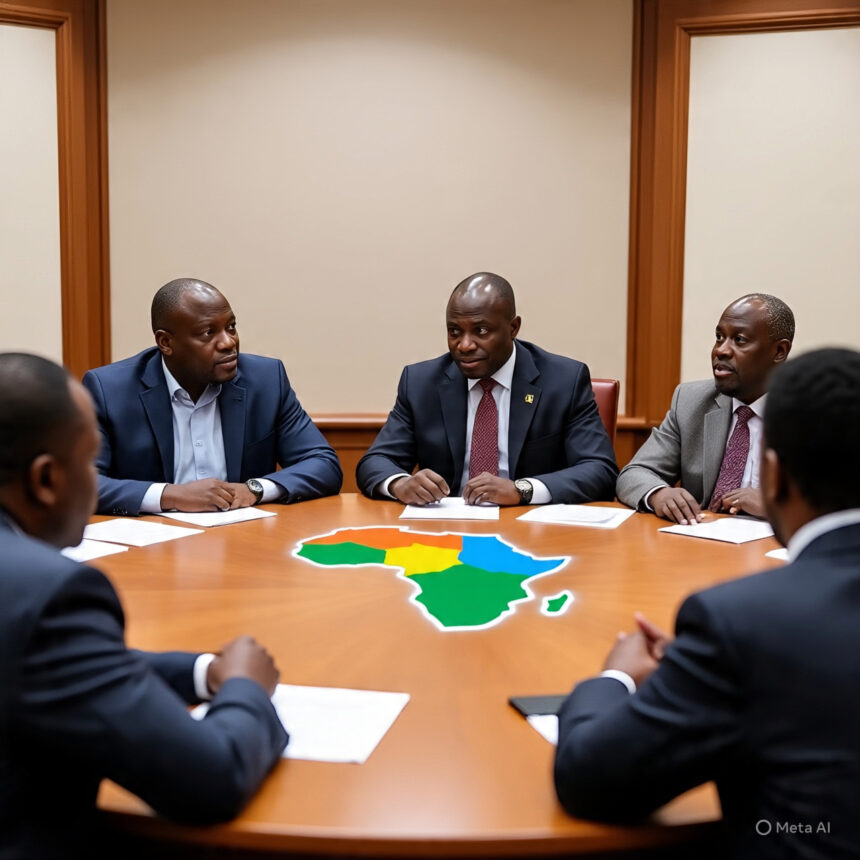There’s a storm brewing over Ghana, and it didn’t start yesterday.
The tragedy is layered, the signs are familiar, and for those who have lived through history’s brutal cycles of foreign meddling and orchestrated collapse, it’s déjà vu all over again.
Since President John D. Mahama came to power, Ghana has been quietly strengthening ties with Sahel countries, especially Burkina Faso and Mali, who have rejected French and American military presence and charted new Pan-African courses.
The AES alliance threatens Western hegemony. It signals a post-FRANCOPHONE, post-NATO Africa. Ghana’s collaboration with these countries raised alarm bells in London, Paris, and Washington.
Moreover, Ghana’s exploration of new energy partnerships, its growing gold reserves, and its subtle shift away from IMF dependency sent one clear message to the West: Ghana might become too independent to control.
So, they’ve moved quickly to clamp Ghana’s wings way before it even begins to fly.
Again, it didn’t start today, Ghana has always been a target of foreign manipulation.
Let’s take a scroll on the annals of history
When Kwame Nkrumah declared Ghana’s independence and sought to lead a united, self-reliant Africa, Western powers panicked. He built alliances with China and the Soviet Union, launched industrial projects, and rejected IMF dependency. What followed? Sabotage.
In 1966, the CIA, with British support, overthrew Kwame Nkrumah. That wasn’t a mere coup, it was a surgical demolition of African sovereignty. Nkrumah had dared to build an independent Pan-African path, nationalize Ghana’s economy, and resist neocolonial interference. He built Akosombo Dam, Ghana Airways, Tema Port, and refused IMF conditionalities. For that, he was marked for removal.
The West executed what they do best, economic strangulation, covert funding of opposition, infiltration of the military, and psychological warfare through the media.
In the same 1966, while Nkrumah was away on a peace mission to Vietnam, a CIA-backed military coup overthrew his government. The evidence is no longer theory. Declassified U.S. documents admit it: the CIA had been monitoring Nkrumah’s Pan-African activities and considered him a threat to Western interests.
What replaced him was a series of unstable, Western-aligned military and puppet governments. The economy was stripped, debt soared, industries collapsed. The “ALIEN COMPLIANCE ORDER” introduced in 1969 under Prime Minister Kofi Abrefa Busia, which ruined hundreds of million dollar thriving businesses, expelled hundreds of thousands of Nigerians and other West Africans, wasn’t just xenophobic nationalism, it was part of a broader strategy to destroy African unity, turning neighbors into enemies.
Ghana was broken not just by bad policy, but by careful, coordinated sabotage by former colonial powers who couldn’t tolerate an African success story outside their leash.
That was how “Nigeria Must Go” was invented way before “Ghana Must Go” came later as a result of the economic effect of the Alien Compliance Order.
So, what then is the Alien Compliance Order?
It is a CIA and IMF written Ghana economic and diplomatic relationship destruction plan ordering all “aliens” (non-Ghanaian citizens) without valid residence permits to leave the country within a specified timeframe, prior to this time, residential permit wasn’t a big deal to reside in Ghana, since Nkrumah is a Pan-African who sees all Africans as one.
When Nkrumah was overthrown by Kotoka and others, Busia came into power. The western sponsored puppet Busia, a staunch opponent of Nkrumah took power and was tasked to dismantle all of Nkrumah’s policies. One of which was to introduce the Alien Compliance Order.
With Alien Compliance Order, Over 2 million Africans, especially Nigerians and Togolese, were expelled overnight. This was no immigration policy. It was the severing of Pan-African bonds, dismantling of regional unity, and insertion of ethno-nationalism.
That order targeted foreigners, knowing full well that the vast majority of them were Nigerians. The order demanded that all non-Ghanaians without proper residency papers leave the country within a short period. As a result, Nigerians were forced to auction off everything—cars, houses, farms, businesses—at a ridiculously low prices, just to leave. Many couldn’t even sell their assets and had to abandon them.
Worse, the Ghanaian government blocked access to their bank accounts. Nigerians were only allowed to take £2,000 with them, even though many had hundreds of thousands to millions of pounds in the banks. These actions traumatized many Nigerians. Families were broken. People died in detention. And the indigenous Ghanaians took over the farms, businesses, and properties that Nigerians left behind.
The consequences for Ghana were immediate and devastating.
Cocoa production collapsed. Ghana’s global share fell from 50% to 30% because Nigerians had been the ones managing the farms. Prices of goods doubled because the Nigerians, who had kept prices affordable, were gone. Transportation collapsed because Nigerians owned most of the vehicles and transport systems.
And thousands of jobs were lost overnight because Nigerian-owned factories and farms shut down.
Ghana fell into crisis. It was a period of immense hardship, and it all started with the Alien Compliance Order. That decision marked the beginning of Ghana’s economic downfall and the famine that later swept through the country.
What about Nigeria? Nigerians suffered too. Lives were lost. People died in Ghanaian custody. Entire families were displaced. Businesses were destroyed. Generational wealth vanished. And even when they tried to leave with their savings, the banks denied them access. It was a deep economic sabotage.
Years later, in 1985, it took Jerry John Rawlings traveling to General Ibrahim Babangida to renew diplomatic relations between Ghana and Nigeria. Until then, there was no peace between the two countries. Things were still very bad, even during Rawlings’ time, because the west destroyed the fast rising Ghana through Busia.
Now, Ghana is doing something that has made it the unexpected nerve center of AES (Alliance of Sahel States) access to the outside world. Through the Port of Tema, Ghana is providing Burkina Faso, a landlocked nation undergoing revolutionary, anti-imperial transformation, a critical sea corridor to bypass dependence on French-controlled Côte d’Ivoire and shaky Togo. This move, though simple on the surface, is a geopolitical earthquake. It threatens to break the Western chokehold over the Sahel and West Africa’s trade routes.
For those who don’t understand global power games, here’s what that means:
Burkina Faso’s rapid industrial push cannot succeed without sea access. And Ghana, not Togo, not Côte d’Ivoire, is giving them that door. That’s not just economic cooperation. That’s rebellion against the empire.
And empires do not like rebellion.
Ghana’s warm ties with Mali, Burkina Faso, and Niger have become intolerable to certain foreign powers. These ties threaten to create a strong, interconnected bloc of sovereign African nations who are trading with each other, building infrastructure, and cooperating on security, without begging the West.
Worse still (for them), Ghana under Mahama has maintained a relatively stable economy amid global turmoil, and refused to sell out the security of its citizens to foreign digital ID schemes like MOSIP. It has not rushed into the arms of USAID or EU-funded policy captures, even when tempted with sweet loans and partnerships.
Now ask yourself, if you were the empire, what would you do?
You’d apply the playbook.
Create scarcity – Start with fuel. Make life harder. Manufacture artificial shortages. Blame the government.
Seed unrest – Use civil society, NGOs, and even paid influencers to stir protests and resistance. Amplify any legitimate grievance, but spin it politically.
Weaken institutions – Sow distrust in the military and security outfits. Make them look incompetent or oppressive, and then encourage civilians to reject their legitimacy.
Build opposition hype – Position a compromised alternative as the “voice of the people.” Someone who will “restore order” but behind the scenes is fully aligned with Western donors.
Repeat until regime change.
This is not a theory. This is a method. Nigeria lived it.
In the years leading up to 2015, the exact same model was used to dismantle the Jonathan administration. The same fuel protests. The same military delegitimization. The same media campaign. And the same foreign-backed savior figure.
Ask Nigerians who were awake in 2015.
When Goodluck Jonathan began implementing policies to decouple Nigeria from the Western grip, pushing indigenous enterprise, attempting to regulate oil contracts, investing in sovereign tech infrastructure, he became a target.
The CIA, working through a network of U.S.-funded NGOs, media outlets, social media influencers, and compromised activists, activated an artificial storm of public outrage.
The protests were not organic. Leaks have since confirmed that groups like the National Endowment for Democracy (NED) and USAID quietly funneled money into civil groups to stir anti-government sentiment. Boko Haram’s rampage was also curiously “uncontained” until Buhari was installed, despite billions in U.S. military aid.
When Goodluck Jonathan tried to steer Nigeria towards stronger regional ties, diversify the economy, and put national sovereignty ahead of imperial interests, chaos was unleashed. The CIA’s fingerprints, as revealed in multiple credible whistleblower accounts and declassified cables, were all over the political upheaval. There were foreign-funded “pro-democracy” NGOs, carefully amplified protests, sabotage within the security architecture, media psyops, and economic strangulation tactics. The goal? Install a more compliant leader. Enter Muhammadu Buhari, the perfect puppet for a new neocolonial era.
The result?
A destabilized Nigeria, foreign capture of key policies, abject poverty ridden Nigeria and a decade of hardship and erosion of sovereignty.
Long story short, Jonathan was out, Buhari in. And Nigeria never recovered.
Now, Ghana is being prepped for the same sacrifice. But this time the stakes are bigger. Because Ghana is no longer just Ghana, it is a corridor, a connector, a continental lifeline.
They must break Ghana to isolate the AES.
They must break Ghana to weaken Burkina Faso.
They must break Ghana to reassert Western control over West Africa.
And how is this happening or going to happen?
Let me be blunt: Someone is trying to light a match in West Africa.
In July 2024, terrorists in northern Mali ambush a group of Malian soldiers and Russian private military contractors. The result? 47 Malians dead. 84 Russians dead. And guess who takes credit? Ukraine. Yes. Ukraine, the same country supposedly fighting a war of self-defense is suddenly proud of orchestrating violence in Africa.
The Sahel bloc responds with fury. They sever diplomatic ties with Ukraine. They take it to the UN. That was the first warning shot. Then July 11, 2025, just over a year later, Zelensky comes out with a tweet claiming that Ghana had signed a military deal with Ukraine. According to him, Ghana would buy Ukrainian drones and deploy Ukrainian soldiers to its northern border with Burkina Faso.
Now pause. Think.
Ghana shares over 600 kilometers of border with Burkina Faso, a key Sahel alliance member. If the alliance had just cut off Ukraine because of terrorist support, and now Ghana is supposedly inviting Ukraine to its doorstep, what does that look like? What does that feel like? A betrayal? A provocation? A prelude to war? But guess what? It was a lie. Zelensky made the whole thing up.
There was no such deal. No drones. No troops. Just a phone call twisted, misrepresented, and amplified across global media to create friction between Ghana and the Sahel. That’s not diplomacy. That’s sabotage.
And almost as if on cue, the chaos machine went into overdrive.
A video began to circulate on Ghanaian social media. It showed a Nigerian man supposedly declaring plans to create a Nigerian ethnic kingdom inside Ghana. It was old, recorded back in 2013. But it was suddenly everywhere. Then a new hashtag emerged: #NigeriaMustGo. But it wasn’t organic. It was bot-driven. Inauthentic. Coordinated. Accounts pretending to be Nigerians even called for war against Ghana. Others claimed to be Ghanaians demanding mass expulsions. It was fake. All of it. Manufactured outrage. Artificial animosity.
At the same time, Freda Anong, a diplomat at Ghana’s High Commission in Nigeria was brutally tortured and murdered in Abuja. Days later, Ghana’s ambassador’s residence was broken into. And somehow, we’re supposed to believe these are all just random events? Nah. This is a playbook. A strategic, foreign-orchestrated campaign to destabilize the region. Step by step. And it’s working because we’re too distracted arguing about who makes better jollof.
On August 6, 2025, a helicopter carrying some of Ghana’s most important government officials crashed under suspicious circumstances. Among the dead:
Ghana’s Environment Minister, a vocal opponent of illegal mining and foreign exploitation, who was spearheading a policy reform to clamp down on the billions of dollars being lost to illicit gold trade and environmental destruction.
The chopper was Chinese. The passengers were not ordinary. They were key pillars in the country’s strategy to restore economic dignity and stop illegal mining, particularly galamsey, where Chinese nationals dominate the underground economy. I will explain why this is not an oversight in a different article.
And just like that:
Key Economic Strategists, who were charting a new path toward economic self-reliance and deeper AES integration
Regional Governors, working on ethnic reconciliation and national cohesion after months of conflict in the northern regions.
Top Military Officials, who were pushing for regional counterterrorism cooperation, directly aligned with the goals of the AES were all gone.
And the President, John Mahama, narrowly escaped.
Sources now confirm that Mahama was scheduled to be part of that helicopter trip, which was en route to a regional security and economic retreat addressing escalating ethnic clashes and border insecurity. At the last minute, he canceled. Fate or foresight, it saved his life. But the death of these officials was a surgical strike, not just on human lives, but on the very future of Ghana.
For those at the back, Ghana lost its Defense Minister, Environment Minister, Chief of Staff of the Army, and top security officers in a single helicopter crash.
That’s a deep national security issue.
Do you know how rare this is? Four top-level officials from strategic ministries all killed in a “weather-related” accident?
Coincidence? Or cleanup? Your guess is as good as mine.
But, the message was clear: nobody is safe. Not the ruling class. Not the opposition. Not even the military. It was a reminder that the “handlers” are still in charge, and they are willing to kill to keep Ghana in check.
They need Mahama out of the picture. He’s not radical. But he’s also not theirs. He still believes in some version of sovereignty. So now, just like Jonathan in 2015, he’s being discredited. He’s being isolated. He’s being set up for defeat by an alliance of donor-sponsored campaigns, elite betrayal, and digital warfare.
Why is this significant?
The endgame is simple: break Ghana so the AES countries can be surrounded and squeezed. Create chaos in Accra to build corridors of control in Ouagadougou.
By destabilizing Ghana, the West is attempting to:
Cut off Burkina Faso’s access to the Atlantic.
Prevent possible collaboration between Nigeria and the AES.
Use Ghana as a puppet state in the next regional war.
Collapse the dream of Pan-African sovereignty by disuniting the sub-region.
This is not a Ghanaian problem. This is a West African problem. And if we don’t act now, it will soon become an African funeral.
Everything happening in Ghana now bears the same bloody footprints we saw in Nigeria before 2015.
The fuel protests.
The sudden destabilization of national security.
The emotional manipulation of the masses.
The deliberate act of trying turn the people against a president who was steering the country out of dependency into Pan-African alignment.
The tactics are not new.
The actors are not new.
The targets are not new.
It happened in Nigeria. Now it’s Ghana. Tomorrow it could be Benin. Or Senegal. Or even South Africa.
The moment Ghana’s economy began making waves, the moment it became a viable AES-aligned partner with ports open to Burkina Faso and the Sahel, a helicopter crash mysteriously wiped out key officials, economic advisors, and the Environment Minister who was tackling illegal mining, the biggest drain on the country’s sovereignty.
This was not an accident. It was an operation. A hit. A statement.
Ghanaians, be warned.
You are under siege, and the war is not conventional.
The enemy won’t come in uniforms. They’ll come in hashtags, influencers, “protests,” and “experts” on television.
They’ll manufacture consent and call it democracy.
They’ll manipulate you into burning down your own house with your own hands, and then arrive with the fire extinguisher called “regime change.”
If you love Ghana, protect it now.
Don’t fall for the psychological operations.
Don’t fall for the agent provocateurs. Don’t fall for the same mistakes that shattered Nigeria in 2015.
Don’t open the door to those who never left, they just rebranded.
And for the rest of Africa, watch Ghana like a hawk.
The African continent is not free. And Ghana is once again the battleground. But this time, we know the playbook.
We’ve seen it in Libya. In Sudan. In Mali. In Ethiopia. In Burkina Faso. And now in Ghana.
This is not the time for silence. This is not the time for tribalism. This is not the time for politicians.
This is the time for vigilance. For unity. For intelligence. For revolution.
If Ghana falls, AES is next. If Ghana stands, Africa rises.
And how this ends may determine whether the AES dream and freedom in greater parts of Africa lives or dies.
History is not repeating itself.
It is being re-executed, with a better PR.
Do not be blind to it, be vigilant!
Written by Onyeoma Nwachinemere, for Media One Africa







